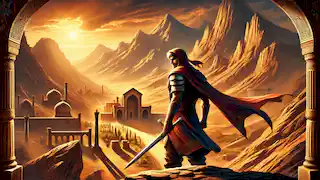In the annals of ancient Iran, where vast empires rose and fell, and legends echoed through the mountains and deserts, one name stood out for his unparalleled courage and determination—Bahram. Known far and wide as a hero of unmatched strength and wisdom, Bahram was destined to face trials that no mortal could endure. His journey was not just one of battle, but of self-discovery, loyalty, and redemption. This is the tale of his twelve labors, each more harrowing than the last, and how he rose from a simple warrior to become a legend whispered through the ages. Bahram's first labor was to defeat the great lion that terrorized the province of Yazd. This lion was no ordinary beast—it was said to be a creature of ancient magic, its mane infused with the essence of fire and its roar capable of shaking the very earth. The people of Yazd lived in fear, unable to venture beyond their village walls. When Bahram arrived, the townspeople gathered around him, hopeful yet skeptical. The lion had already bested many of Iran's strongest warriors. Yet Bahram was undeterred. He sharpened his blade, donned his armor, and ventured into the wilderness where the beast was said to roam. As the sun began to set, Bahram encountered the lion near a cliffside, its fiery mane glowing against the evening sky. With a roar, the lion charged. Bahram stood his ground, waiting for the perfect moment to strike. In a swift motion, he dodged the beast's claws and brought his sword down upon it. The battle was fierce, and the ground beneath them quaked as the lion tried to overpower him. But with one final thrust, Bahram plunged his blade into the lion's heart, silencing its roars forever. The people of Yazd celebrated his victory, hailing Bahram as their savior. But Bahram knew this was only the beginning. Greater challenges awaited him. Word of Bahram’s deeds soon reached the king, who called upon him for a second, far more dangerous task. Deep in the Lut Desert, a serpent of immense size and malice had awakened. It slithered beneath the sands, devouring anyone who dared to cross its path. Merchants and travelers spoke of seeing its enormous scales gleaming in the moonlight before being swallowed whole by the beast. Bahram journeyed to the heart of the desert, armed with only his sword and his courage. For days, he wandered through the scorching heat, following the rumors of the serpent's last sighting. One night, as the moon shone brightly over the dunes, the ground beneath Bahram began to tremble. The serpent had found him. The creature was monstrous, its body coiled and towering above the sand like a living mountain. Its eyes glowed a sickly yellow, and its hiss echoed through the desert winds. Bahram knew he could not defeat this beast with strength alone. Using the environment to his advantage, he lured the serpent toward a rocky cliffside. As the serpent lunged at him, Bahram dodged its attack, causing it to slam its head against the rocks. Stunned, the serpent fell into a deep crevice, where Bahram drove his sword through its skull. For his third labor, Bahram was tasked with bringing an end to the terrible storms that plagued the province of Mazandaran. These storms, said to be conjured by an ancient demon, had destroyed crops, flooded villages, and made life unbearable for the people. Bahram set off for Mazandaran, determined to put an end to the demon's reign. Upon arriving, Bahram learned that the demon dwelled in the mountains, where it commanded the elements from a dark and foreboding cave. As he climbed the treacherous mountain paths, the wind howled around him, and lightning flashed across the sky. Inside the cave, the demon waited—its form a mass of swirling storm clouds, with eyes that crackled like lightning. Bahram knew that his sword alone would not defeat the demon. He needed to disrupt its connection to the storm. Drawing upon his knowledge of ancient magic, Bahram fashioned a shield from the mountain's stones, one that could absorb the demon's lightning. When the demon struck, Bahram raised the shield, trapping the energy within it. With the storm dissipated, the demon's power weakened, and Bahram struck it down with a single blow. Bahram's next labor took him to the shores of the Caspian Sea, where sailors spoke of a demon that lurked beneath the waves. This creature, half-man and half-beast, had dragged entire ships beneath the surface, never to be seen again. The sea had become a graveyard for those who dared to sail its waters. Bahram boarded a small vessel and sailed into the heart of the sea, where the demon was said to dwell. For days, the waters remained calm, but on the fourth day, the skies darkened, and the sea began to churn. From the depths, the demon emerged, its body covered in scales and its eyes glowing with malice. The battle between Bahram and the demon raged for hours, with waves crashing over them as they fought. Bahram struggled to stay afloat as the demon's powerful limbs dragged him beneath the surface. But in a final act of defiance, Bahram slashed his sword across the demon's chest, and with a deafening roar, the creature sank into the depths, never to rise again. In Isfahan, a sacred fire temple had been desecrated by a band of marauding thieves. These men had not only stolen from the temple but had desecrated its holy flames, bringing the wrath of the gods upon the land. Bahram was called upon to restore the temple and bring justice to those who had wronged the gods. Bahram tracked the thieves to their hideout, where they were celebrating their ill-gotten gains. With swift and precise strikes, he defeated the thieves, recovering the stolen relics and returning them to the temple. But the flames, once sacred, had been extinguished, and Bahram needed to rekindle them. Through a ritual that called upon the gods of fire, Bahram lit the temple's flame once more, restoring peace to the region. In the desolate province of Sistan, an ogre had claimed a mountain as its domain. This creature was a terror to all who lived nearby, crushing villages beneath its massive feet and devouring livestock. Bahram's sixth labor was to rid Sistan of this beast. When Bahram reached the ogre’s lair, he found a creature so large that it towered above the tallest trees. The ogre roared in fury, swinging a massive club as it charged toward Bahram. The battle was fierce, with Bahram narrowly dodging the ogre’s crushing blows. But with his agility and speed, Bahram was able to scale the beast's back and plunge his sword into its neck, bringing the ogre crashing to the ground. Bahram's seventh labor was unlike the others. He was tasked with retrieving a feather from the legendary Simurgh, a giant bird of wisdom and power that resided in the highest mountains of Iran. The Simurgh was not a creature of malice, but approaching it was perilous, as it guarded its nest fiercely. Bahram climbed the highest peak, where the Simurgh's nest lay hidden among the clouds. When he reached the summit, the majestic bird appeared before him, its wings spanning the horizon. Knowing he could not defeat the Simurgh by force, Bahram knelt in respect, offering gifts of gold and rare spices. Impressed by Bahram's humility and honor, the Simurgh gifted him one of its feathers, a token of wisdom and power. The eighth labor took Bahram to the heart of the city of Tehran, where a shadowy figure known only as "The Shade" had been causing unrest. This figure, a master of stealth and deceit, was said to have no face, only a shadowy form that melted into the darkness. Bahram knew that to defeat The Shade, he would need to rely on his wits rather than brute strength. He set traps around the city, using mirrors and bright lights to expose the figure. One night, as The Shade attempted to strike again, Bahram's trap was sprung, and the figure was revealed—a man corrupted by dark magic. With swift justice, Bahram ended The Shade's reign of terror. Bahram's ninth labor was perhaps the most grim. A mountain in northern Iran had become a place of death, where travelers who ventured too close never returned. The mountain was said to be cursed, and the bones of the dead littered its slopes. Bahram ventured into the heart of the mountain, where he encountered the spirit of a long-dead sorcerer who had cursed the land. The sorcerer offered Bahram a choice: leave the mountain and live, or face eternal death. Bahram chose to fight, and after a fierce battle with the sorcerer's undead minions, he broke the curse, releasing the souls trapped within the mountain. In the city of Tabriz, Bahram was faced with a challenge of intellect rather than strength. The ruler of the city had promised his daughter's hand in marriage to anyone who could solve the riddle of the ancient scrolls. Many had tried and failed, but Bahram, with his wisdom gained from the Simurgh's feather, approached the challenge with patience. The riddle spoke of time, love, and destiny. After days of contemplation, Bahram solved the riddle, proving that the answer lay not in knowledge but in understanding the heart. With this victory, Bahram won the favor of the people of Tabriz and the ruler's blessing. For his eleventh labor, Bahram had to descend into the ice caverns of Alborz, where a great frost giant had made its home. The giant had frozen the land, causing crops to wither and people to starve. Bahram ventured into the frozen depths, where he faced the frost giant in its lair. With the heat of the sacred fire he had once restored, Bahram was able to melt the ice and weaken the giant. After a brutal battle, Bahram defeated the frost giant, bringing warmth and life back to the land. Bahram's final labor was the most difficult. He was tasked with opening the Gates of Heaven, which had been closed to mortals for centuries. The key to the gates was hidden deep within the underworld, guarded by the spirits of the dead. Bahram descended into the underworld, where he faced his greatest fear—himself. In a hall of mirrors, he was forced to confront his own doubts, fears, and regrets. Only by accepting his flaws and embracing his humanity could he retrieve the key. With the key in hand, Bahram ascended to the Gates of Heaven, where he opened them for the first time in millennia, bringing peace and harmony to the world. Thus ended the twelve labors of Bahram, a hero whose strength, wisdom, and courage reshaped the land of Iran. His legend was passed down through generations, a beacon of hope and inspiration for all who heard his name.The Lion of Yazd
The Serpent of the Lut Desert

The Storm of Mazandaran
The Demon of the Caspian Sea

The Fire Temple of Isfahan
The Ogre of Sistan
The Simurgh's Feather
The Shadow of Tehran
The Mountain of Bones

The Riddle of Tabriz
The Ice Caverns of Alborz

The Gates of Heaven
Conclusion
The Legend of the Twelve Labors of Bahram
Reading Time: 10 min

About Story: The Legend of the Twelve Labors of Bahram is a Legend Stories from iran set in the Ancient Stories. This Dramatic Stories tale explores themes of Courage Stories and is suitable for All Ages Stories. It offers Cultural Stories insights. The epic trials of an Iranian hero as he faces mythical creatures and impossible challenges.


















